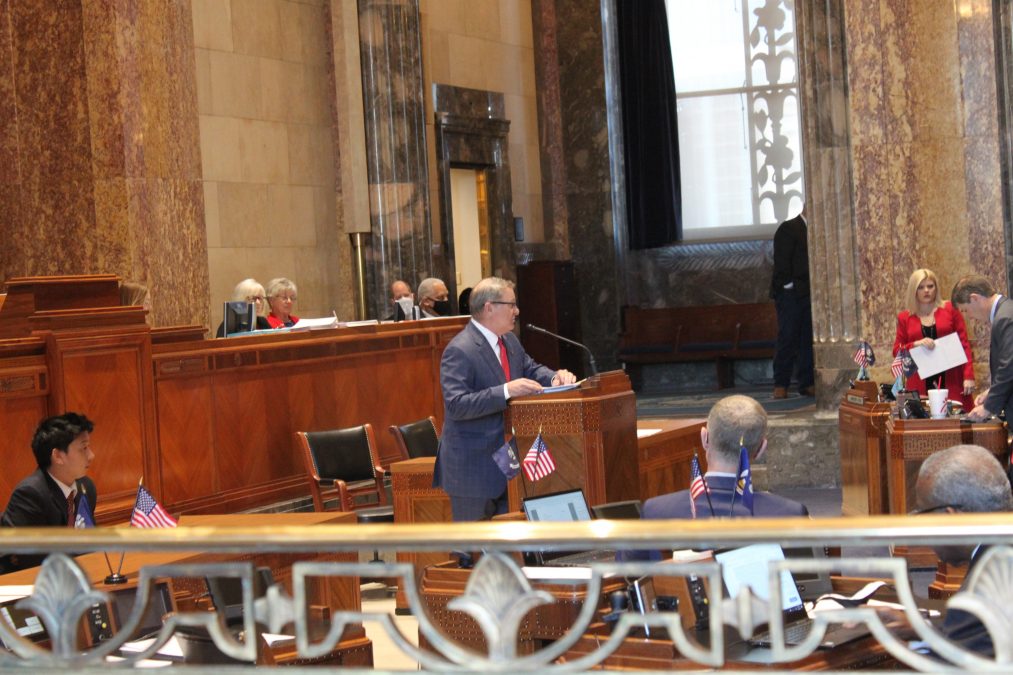
Houma Fire Department Dispatched to Emergency Fire
February 14, 2022
Fire destroys two-story home in Bayou Blue
February 15, 2022By Allison Kadlubar, Alex Tirado and Lura Stabiler, LSU Manship School News Service
BATON ROUGE—Two weeks of debate, public testimony and pleas from activists for greater minority representation culminated in a 40-minute Senate floor meeting Monday that advanced two Republican bills mostly maintaining the status quo of the state Senate and Supreme Court district maps.
State representatives then voted 82-21 Monday evening to leave the state House with the same number of minority-majority districts, 29 of 105, that it has now. All of the vote margins in both chambers were large enough to override gubernatorial vetoes if they hold going forward.
“It took a while to get to where we are right now,” Senate President Page Cortez, R- Lafayette, said. “I’m glad that the hawks and the doves kept to themselves today.”
Senate Bill 1, authored by Cortez, kept the state Senate map largely intact with only 11 of the 39 seats representing majority-Black districts.
Sen. Gary Carter, D-New Orleans, pleaded for one final chance to increase minority representation. He said he had spent the weekend meeting with elected and unelected constituents concerning district lines.
“These aren’t just lines on a page,” Carter said. “These are people we represent, who we love, who we fight for, who invite us into their homes.”
Carter proposed an amendment to protect the minority nature of minority-majority state Senate Districts 5 and 7 by increasing the number of African American voters in them.
Sen. Patrick Connick, R-Marrero, contested the amendment. He and 27 other senators voted to reject it.
Senators voted 27-12 to advance both the state Senate redistricting bill and SB15, the state Supreme Court redistricting bill, to the House.
Senate Bill 15, authored by Sen. Sharon Hewitt, R-Slidell, also leaves the 25-year-old Supreme Court district map mostly the same, retaining only one majority-minority district.
“The Supreme Court is severely malapportioned,” Hewitt said. “The map looks very familiar in terms of how it represents the continuity of representation.”
Sen. Cleo Fields, D-Baton Rouge, offered two amendments to Hewitt’s bill that would have increased the number of majority-minority districts.
He proposed that District 5 and District 7 should be majority-minority districts. His lines showed that Black voters would make up over 53-57% of both districts while maintaining an equal number of voters in each district.
Hewitt contested the amendment.
“I do believe that the bill that I have proposed does a better job of adhering to our redistricting principles, in particular, to maintain the core of prior districts, especially in the northern part of the state,” Hewitt said.
The Senate bills for both its own redistricting and that of the Supreme Court exceeded the 26 votes that would be needed to override a veto if Gov. John Bel Edwards rejected either of the proposed maps.
In contrast to Hewitt’s bill, Rep. Barry Ivey, R-Baton Rouge, received bipartisan support Monday for his House Bill 22 that provides for a second majority-Black Supreme Court district.
Ivey’s proposed second minority-majority district would be 56.6% Black and encompass parishes along the Arkansas border, move down the Mississippi River and end in East Baton Rouge Parish.
Ivey explained to the House and Governmental Affairs committee how his bill is stronger than others in its compactness, competitiveness and minority representation.
Two Republicans on the committee, Rep. Tanner Magee of Houma, and Rep. Mike Johnson of Pineville, voted with Democrats to advance Ivey’s bill to the House floor.
House members also took to the House floor Monday to debate House Bill 14, which would redraw the maps of many of the 105 state House seats.
Rep. Cedric Glover, D-Shreveport, presented an amendment that would have added an additional majority-minority district in Shreveport, increasing the majority-minority districts in the bill to 30 from 29.
“It is the right thing to do,” said Glover.
Glover argued that his amendment was not only fair but that it is in line with federal law.
That amendment and two others by Glover failed in largely party-line votes.
Margaret DeLaney contributed to this story.
Photo: State Senate President Page Cortez, R-Lafayette, sponsored the Republican bill to redraw the maps for the state Senate. Photo by: Alex Tirado/LSU Manship School News Service












